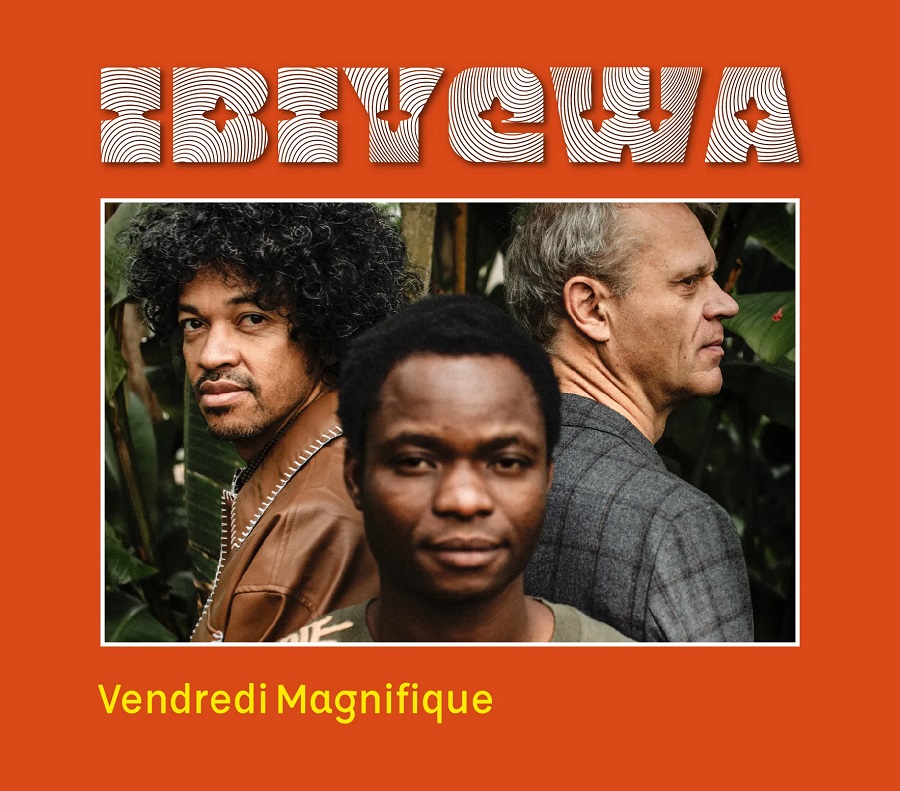IBIYEWA – Vendredi Magnifique
Here we resemble each other. Under that name – in Yoruba, the language spoken in Nigeria, Togo, and Benin – three musicians come together: drummer Angelo Moustapha from Benin, Belgian saxophonist Toine Thys, and guitarist Joel Rabesolo from Madagascar. Where else but in Brussels could the seed germinate that eventually led to this debut album? The Belgian capital has evolved into a melting pot of jazz styles, where young musicians flock to indulge in unexpected hooks, new rhythms, unsuspected harmonies, and especially the courage to bring all these elements together in compositions that explore the unknown, unlock its magic, and ultimately present it to a blessed wider audience. Like IBIYEWA. Because the compositions on “Vendredi Magnifique” are genuinely magical. More importantly, they express exactly what musicians cherish as their greatest ambition: absolute freedom.
Conventions exist to be broken. Rhythms are conventions, something agreed upon, firmly outlined and immutable in the definition of many beats per measure. From the first notes on this album, Moustapha seems to mock every convention. “Natural,” the opening track, has its rhythm, or rather, its convention. Now, jazz drummers are almost obligated by their status to color outside the lines; indebted to Blakey and Rich, drummers like Nate Smith and Mark Guiliana – who, incidentally, is better known as the drummer on Bowie’s “Blackstar” – add a new, personal vocabulary to jazz patterns. But it must be said that Moustapha is the superlative – brilliant, sometimes unfathomable, certainly intriguing, and always captivating.
It must have been a joy and simultaneously an enormous challenge for Thys and Rabesolo to play melodies based on these complex rhythms. The risk is that the whole thing would sound very contrived, but the ten tracks on the album are each a pleasure to listen to, precisely because IBIYEWA often presents it so effortlessly and accessibly. The trio uses a unique, different language but somehow manages to tell the story clearly; every note falls exactly into the right place, sounds flow naturally into each other and translate the desired emotion, unerringly and without pretense. That is indeed an achievement, especially because Moustapha, Thys, and Rabesolo shy away from no experiment.
Take the short “Variant Ibiyewa Intro,” a solo by Thys, played with an electrified and sampled saxophone. The variants are the result of months of home experimentation, alone, as a result of the lockdowns. Many albums now feature tracks that emerged during that lonely period, as a kind of report from that time, as relics from a period when we necessarily had to forego freedom for a while and simultaneously new creativity emerged. It fits on this album that breathes freedom in everything. Themes and improvisations flutter over and through the African rhythms, like children in a new playground, discovering, searching, probing for yet undiscovered possibilities, determined to see, feel, hear, and above all, share everything.
Sometimes the playing is hard and raw, as when Thys picks up the electric guitar in the last part of “Natural.” But there are also lovely compositions, such as “Lydia,” a piece Moustapha composed as a tribute to his mother. Here, the playing is restrained: lovingly, Thys and Rabesolo let the notes flutter around each other. But the trio wastes no time and lets us listen in ultimate wonder to “Zejo Zejo,” a composition by the Malagasy guitarist. The piece has a rhythm very unusual to Western ears, where the melody is counted in seven over a traditional triple-meter rhythm. The melodies and improvisations are played on acoustic instruments, including a bass clarinet and soprano saxophone.
The wonder is permanent. No piece is like the previous one; IBIYEWA continuously takes you into their world where music is optimally free, as each human should be free. A world where “we are all fleeting nomads. Nothing truly belongs to us; only memories remain,” according to an accompanying text for the finale of this album, “Mpamoria.” Before we celebrate that finale, this Brussels trio has left no emotion untouched. We have experienced romance in the hushed “Maintsoahitra” and celebrated wildly to “Ensemble” which – finally, as this was what we were waiting for – ends in a phenomenal drum solo. Eclectic, it’s called in marketing jargon. For this album, however, that is an understatement.
A nomad should move on, but we’re not breaking up yet and immerse ourselves once more in the magnificent freedom that IBIYEWA offers us – and we praise the knowledge that although we may all resemble each other as humans, some among us are truly musically superior. Thank heavens. (9/10) (Homerecords)





